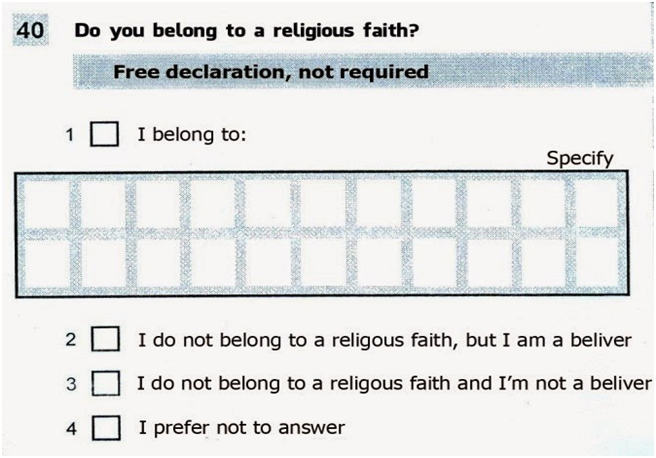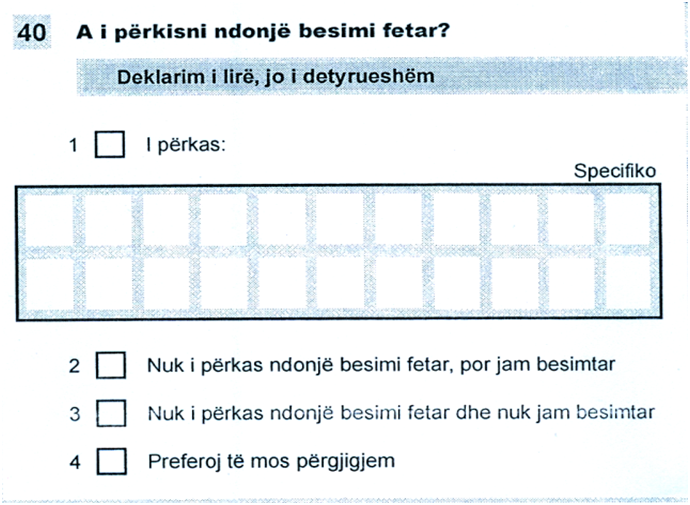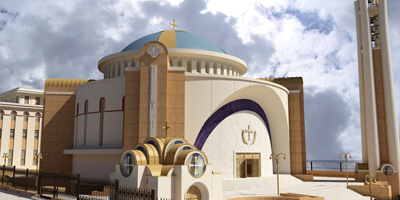
The Orthodox Autocephalous Church Of Albania
OFFICIAL DECLARATION
The results of the 2011 Census regarding the Orthodox Christians in Albania are totally incorrect and unacceptable.
|
1. Muslim Sunni [ ]
|
5. Christian Evangelical [ ]
|
|
2. Muslim Bektashi [ ]
|
6. Follower of another religion.Which? [ ]
|
|
3. Christian Orthodox [ ]
|
7.Atheist [ ]
|
|
4. Christian Catholic [ ]
|
Various politicians and religious groups lined up against this question and cultivated the fear, which became wide spread, that religion could be connected to a declaration of ethnic identity.
The Orthodox Community did not oppose this effort, but restricted itself to emphasizing the duty to have objectivity and seriousness throughout the entire registration process. As a result, the question regarding religion became optional, unclear and difficult for citizens, especially for those with limited education. It would appear that this was done in order to make it possible to influence the answers given by citizens and achieve a pre – ordained result.) The INSTAT Census form reads:
 |
 |
Question No. 2 catches the attention immediately. There is no religion in the world with the name “believer” (besimtar). “Believer” (besimtar) means follower, but of exactly which religion? Despite the obscurity of the question, the results of the Census are given with clear connection to established religious communities: Muslim 56.70%, Catholic 10.03%, Orthodox 6.75%, Bektashi 2.09%, Evangelical 0.14%, other Christians 0.07%, Atheist 2.50%, undefined believers 5.49%, followers of other religions 0.02%, did not answer 13.79%.
2. A questionnaire regarding the Census was given to Orthodox participants at liturgies held on two Sundays, December 9 and 16, 2012 in Tirana, Durrës, Berat, Korçë, Vlorë, and other cities. The results were disturbing: 7,118 persons completed our questionnaire which included their first and last names and their address. **Of these only 2,469 persons or 34.68% declared that they were visited and questioned regarding their religious affiliation during the Census; 4,643 persons or 65.23% were not visited or when visited were not asked about their religious affiliation by registrars of the Census; 56 persons declared that the registrars wrote information in pencil or not in the official form and an additional eleven persons testified that the registrars refused to record religious affiliation or did so only under significant pressure. Moreover we have testimonies that in a large number of cases citizens were not asked to sign the Census form and that information was written in a notebook rather than on the official form as procedure required. We underline that the results of this questionnaire show that in 65% of the cases there were irregularities in the Census taken with regard to religious affiliation.
3. During 100 years of the existence of the Albanian state there have only been two other censuses in which a question about religious affiliation was included. In the statistics of 1927, we find that: Muslims: Sunni and Bektashi make up 67.5%; Christians: Orthodox 22.3% and Catholics 10%. According to the Census done by the Italian authorities in 1942, the results were: 68,9% of the population were Muslims (of which 54.17% Sunni and 14.73% Bektashi) and 31% were Christians (of which 20.7% Orthodox and 10.3% Catholic.)
The restoration of religious life in all the traditional religious communities and especially the flourishing of the Orthodox Autocephalous Church of Albania, in the years since the coming of democracy in 1991, after the long antireligious persecution, are obvious to any non-biased observer. Therefore, it is surprising and to be wondered at why certain groups attempted to show with various manipulations that the Orthodox population has been reduced by two-thirds.
The Orthodox Church possesses evidence (baptismal registers, from both before and after the persecution, and the registers of 460 Orthodox parishes throughout the country) that the number of Orthodox Christians in Albania exceeds 24% of the population. The question may rightfully be raised, where does the Census hide the other 17% of Albanians that are Orthodox Christians?
All the evidence supports the fact that the vast majority of those who were registered as “did not answer 13.79%” and “undefined believers 5.49%” are Orthodox Christians. This would include: a) Those who willingly chose not to answer the questions regarding faith and religious affiliation, i.e. most of the Greek minority, as well as members of the Vlach, Montenegrin and other ethnic minorities. b) Those who avoided a direct declaration of their religion because of psychological pressure created by some extremist groups and threats in connection with the optional declaration of religion and ethnic identity. c) All those that the registrars did not visit, including whole Orthodox villages and neighborhoods. d) Those persons who were visited, but not questioned about their religious affiliation, or even those who declared that they were Orthodox, but whom the registrars arbitrarily placed in the “undefined believer” category. Thousands of persons confirm these facts.
Although the question regarding religion was optional, only to be answered by those who chose to, like the question about ethnic origin, it has become the central point of discussion and interest of this Census. (It should be emphasized that the question regarding ethnic origin in the Census had the following results: Albanians 82.58%, an extremely small percentage of other ethnic minorities and concluded with 13.96% “did not answer”.)
According to the Council of Europe (“Third Opinion of the Council of Europe on Albania adopted 23.11.2011,”) the population census “cannot be considered to be reliable and accurate, raises issues of compatibility with the principles enshrined in Article 3 of the Framework Convention…The Advisory Committee considers that the results of the census should be viewed with the utmost caution and calls on the authorities not to rely exclusively on the data on nationality collected during the census in determining its policy on the protection of national minorities”. It is a well known that in the country national minorities are affiliated with a concrete religion.
* * *
Based on the above facts: We denounce the unscientific method followed for this sensitive religious issue. We protest the lack of professionalism, ignoring international standards. We do not recognize the final results regarding religious affiliation of the population given by INSTAT. Plans and actions of this type undermine the religious coexistence and harmony for which we strive.
The search for the truth is foundational for a civilized society, especially in a case as sensitive as the religious identity of the citizens. Only the truth can help Albania on its journey towards a united Europe and in general, for progress in the twenty-first century.
The Clergy – Laity Council of the Orthodox Autocephalous Church of Albania*
(*This institutional organ of the Church consists of the all members of the Holy Synod, as well as priests and laity – men, women and youth, representatives of the Archdiocese and other Metropolis)
Tirana, December 17, 2012
**Note: 10.1.2013: After a recent collection of written declarations of 25,870 Orthodox believers from several cities in Albania, 17,360 of them, that is 67.10%, were not visited or when visited were not asked about their religious affiliation.
